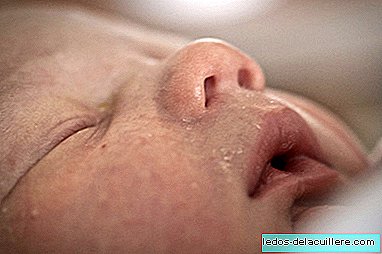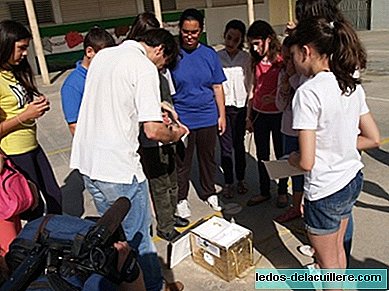
When a baby is born, it is recommended that you spend the first moments with your mother, in skin-to-skin contact, so that she is calm and for the first breastfeeding. Babies, if they are left, are able to crawl on their mother until they reach the breast and suck it, all without anyone having taught them.
Scientists at the Wellcome Trust Sanger Institute in the United Kingdom have wanted to discover what is the mechanism that causes babies to start sucking and breastfeeding and have discovered, despite the fact that the study has been done with mice (I don't know if the results will be extrapolated, although they do), that Babies feed on their mothers because they have learned their smell through amniotic fluid.
Without suction there is no survival
The reason they wanted to investigate this is that suction is a very important step for mammal survival. If what causes it fails and babies do not start sucking many would die soon (not in developed countries where alternative solutions would be sought, of course).
The fact is that the researchers assumed that the mechanism was hormonal, since European rabbit females make use of a pheromone for rabbit babies to start sucking. However, when choosing mice to study them, which they say have a breeding style similar to that of humans, they observed that the mechanism was different.
In the words of Darren Logan, lead author of the study:
We have shown, for the first time, that mice do not respond to a pheromone, but react to a learned response, based on a mixture of odors: the mother's unique smell.
How did they do the study
Then, knowing that the newborns were guided by the smell, they brought several mice to breasts that had been washed and impregnated with various odors (amniotic fluid, mother's saliva, breast milk and urine). Even if it looks like a lie, only the mice that had before them some breasts smelling of amniotic fluid began to suck.
After this they realized that the amniotic fluid contained a pheromone, so they decided to cancel this variable by doing another experiment with an unchanged amniotic fluid and another that had a garlic smell. In theory, if starting to suck depended on pheromone they would breastfeed indistinctly, but it was not so, only those who had breasts with the real smell of their mother's amniotic fluid suckled, which shows that the smell is learned.
Finally, to ensure the results, they did more experiments with mice lacking a gene located in the vomeronasal organ of the nose, which is used to detect pheromones, seeing that they were able to detect the mother's nipple to suck and compared them with mice that they didn't have the ability to smell properly, noting that these did have problems to start feeding.
Extrapolating the results, and connoisseurs of some experiments performed with newborn babies, such as one in which a baby was put a garment on each side, one of his mother and another of another mother, and the baby always turned towards his mother, we realize that babies have a great sense of smell that apparently helps them to know where to breastfeed and where not to. One more sample of what is very important, at birth, not separate mom and baby so that there are no strange odors in between that hinder the start of feeding with breast milk.












